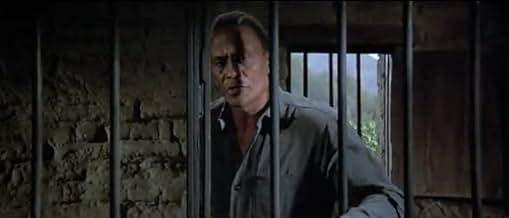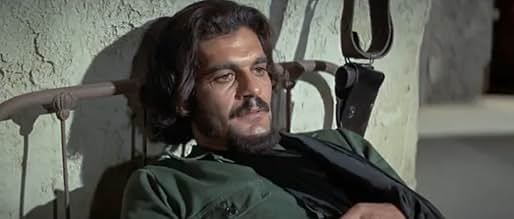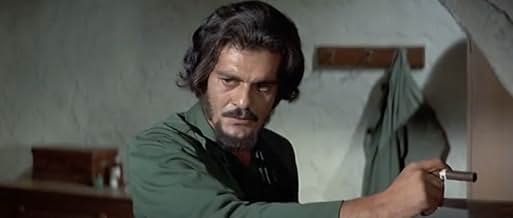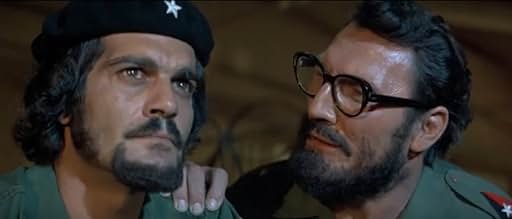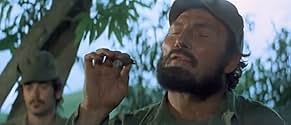IMDb RATING
4.8/10
1.1K
YOUR RATING
An intentionally noncommittal version of the Cuban revolution told through flashbacks, the film recounts Che's switch from doctor to politico in Castro's campaign.An intentionally noncommittal version of the Cuban revolution told through flashbacks, the film recounts Che's switch from doctor to politico in Castro's campaign.An intentionally noncommittal version of the Cuban revolution told through flashbacks, the film recounts Che's switch from doctor to politico in Castro's campaign.
BarBara Luna
- Anita Marquez
- (as Barbara Luna)
Featured reviews
Reason why this movie doesn't ever work out as a good one is because it really has no story to tell, or it at least seems that way, due to the entire way this movie got done and told.
Just don't watch this movie expect to learn anything. While watching this movie you'll have no idea what Che and his buddies are all fighting for and what they want to achieve, if you know nothing to little about Che Guevara and the Cuban revolution. Perhaps this can be blamed on the fact that this is an 1969 movie. Only 2 years after Che's death, so his story was still fresh back in the minds of the audiences at time. Therefore the movie perhaps felt no need to ever explain anything or to go into detail. But this movie was already much hated back in its day, so of course there is plenty more wrong with this movie.
Not only the story won't learn you anything but you also won't learn a thing about the person Che. Nothing in this movie justifies why he is globally regarded still such an icon, since the movie doesn't show anything great or heroic that he ever achieved and his personality in his movie is just very bland as well.
I can't really blame Omar Sharif for it though, while many other still seem to do so. In my opinion the blame should be put with its writing and directing. The story is already bad to begin with by the entire way it gets told makes it all the more worse.
What I also really didn't like about the storytelling was the random insertion of random people narration the events straight into the cam, as if this was a documentary. It comes across as incredibly cheap and lame, also since often the actors just aren't the greatest ones.
Even Jack Palance is real bad in his role. He is supposed to play Fidel Castro but instead he seems more like a caricature of him. And to be frank, he made Castro come across like an idiot. Perhaps this all was intentional though, for propaganda reasons.
The way this movie got shot and all of its action really reminded me of a "The A-Team" episode. I of course love "The A-Team" but this doesn't really seem like a compliment for a movie that tries to tell a serious, historically relevant story.
Perhaps the movie is not as bad to watch as its reputation might suggest but still it's truly really far from a good movie.
5/10
http://bobafett1138.blogspot.com/
Just don't watch this movie expect to learn anything. While watching this movie you'll have no idea what Che and his buddies are all fighting for and what they want to achieve, if you know nothing to little about Che Guevara and the Cuban revolution. Perhaps this can be blamed on the fact that this is an 1969 movie. Only 2 years after Che's death, so his story was still fresh back in the minds of the audiences at time. Therefore the movie perhaps felt no need to ever explain anything or to go into detail. But this movie was already much hated back in its day, so of course there is plenty more wrong with this movie.
Not only the story won't learn you anything but you also won't learn a thing about the person Che. Nothing in this movie justifies why he is globally regarded still such an icon, since the movie doesn't show anything great or heroic that he ever achieved and his personality in his movie is just very bland as well.
I can't really blame Omar Sharif for it though, while many other still seem to do so. In my opinion the blame should be put with its writing and directing. The story is already bad to begin with by the entire way it gets told makes it all the more worse.
What I also really didn't like about the storytelling was the random insertion of random people narration the events straight into the cam, as if this was a documentary. It comes across as incredibly cheap and lame, also since often the actors just aren't the greatest ones.
Even Jack Palance is real bad in his role. He is supposed to play Fidel Castro but instead he seems more like a caricature of him. And to be frank, he made Castro come across like an idiot. Perhaps this all was intentional though, for propaganda reasons.
The way this movie got shot and all of its action really reminded me of a "The A-Team" episode. I of course love "The A-Team" but this doesn't really seem like a compliment for a movie that tries to tell a serious, historically relevant story.
Perhaps the movie is not as bad to watch as its reputation might suggest but still it's truly really far from a good movie.
5/10
http://bobafett1138.blogspot.com/
It was brave of the makers of this film to release it in 1969 when the U.S. war against Communist North Vietnam still raged. It does depict a **failed** attempt to foment revolution in the Third World and on balance it is a negative portrayal of a professional revolutionary. Given the times, any depiction of Guevara and Fidel Castro showing them as human was a bold move.
In the U.S. most publicity has been garnered by Castro's bitterest enemies (those wonderful folks who brought you the **Elian** affair). Fidel has his supporters here, and around the world, also. Many of them seem to have posted comments at this site. The title of this movie is "Che!", not "Fidel!". Naturally, Castro's role will be a secondary one, a decision Castro's supporters seem unable to forgive.
Everyone knows how the story ends, and that is where the movie starts, with Che Guevara's body being transported by helicopter down from the one-room schoolhouse where he was apparently executed after being wounded and captured by an elite unit of the Bolivian Army. It's a strikingly beautiful, almost elegiac shot with the slopes of the Andes stretching to the horizon in the background. The movie proceeds in a semi-documentary style, the story told in flashbacks by Guevara's old Comrades (and some old enemies). Some of the Comrades, visibly aged, give their interviews from prison cells.
While Guevara's early life in Argentina isn't depicted, there is a soundless, striking scene early in the film of Cuban women protesting the dictatorial Battista regime, only to be massacred by Cuban soldiers ("We heard you calling, Cuba and we came...") that well explains what motivated young Ernesto and other youths from Latin America's upper classes to join the Cuban revolutionaries. From there we trace Che's transformation from idealistic medical graduate to hardened guerrilla fighter--summed up in a moment when in the heat of battle he picks up a rifle and leaves his doctor's kit on the ground.
I also disagree with the many criticisms of the portrayal of Fidel Castro by Jack Palance. Palance's movie career was distinctly on the down slope when he accepted the part, but he always had **macho**. Here he captured the 6'4" Castro's dominating physical presence in a land of mostly short statured people.
It is a real pity that this motion picture has completely disappeared. There is not a commercial version of it available anywhere. In the future, perhaps after Omar Sharif has died, this portrait of one of the twentieth century's most charismatic figures will be recognized as the rare achievement it is.
In the U.S. most publicity has been garnered by Castro's bitterest enemies (those wonderful folks who brought you the **Elian** affair). Fidel has his supporters here, and around the world, also. Many of them seem to have posted comments at this site. The title of this movie is "Che!", not "Fidel!". Naturally, Castro's role will be a secondary one, a decision Castro's supporters seem unable to forgive.
Everyone knows how the story ends, and that is where the movie starts, with Che Guevara's body being transported by helicopter down from the one-room schoolhouse where he was apparently executed after being wounded and captured by an elite unit of the Bolivian Army. It's a strikingly beautiful, almost elegiac shot with the slopes of the Andes stretching to the horizon in the background. The movie proceeds in a semi-documentary style, the story told in flashbacks by Guevara's old Comrades (and some old enemies). Some of the Comrades, visibly aged, give their interviews from prison cells.
While Guevara's early life in Argentina isn't depicted, there is a soundless, striking scene early in the film of Cuban women protesting the dictatorial Battista regime, only to be massacred by Cuban soldiers ("We heard you calling, Cuba and we came...") that well explains what motivated young Ernesto and other youths from Latin America's upper classes to join the Cuban revolutionaries. From there we trace Che's transformation from idealistic medical graduate to hardened guerrilla fighter--summed up in a moment when in the heat of battle he picks up a rifle and leaves his doctor's kit on the ground.
I also disagree with the many criticisms of the portrayal of Fidel Castro by Jack Palance. Palance's movie career was distinctly on the down slope when he accepted the part, but he always had **macho**. Here he captured the 6'4" Castro's dominating physical presence in a land of mostly short statured people.
It is a real pity that this motion picture has completely disappeared. There is not a commercial version of it available anywhere. In the future, perhaps after Omar Sharif has died, this portrait of one of the twentieth century's most charismatic figures will be recognized as the rare achievement it is.
Superficial biographical flick about international revolutionary and Castro's second in command Che Guevara, Omar Sharif. The movie gives you the impression that if it wasn't for Che Fidel Castro, Jack Palance, would never have taken over Cuba in what's called the Great Peasant Revolution of 1959. Che, an Argentinian doctor and one-world revolutionary, did in fact land with Castro and his contingent of 82 men off the west coast of Cuba on December 2, 1956.
After being ambushed by Batista's, the Cuban dictator, men only a dozen, including Che & Castro, survived. During the next two years in the Sierra Maestras mountains the dozen revolutionaries grew into the thousands. It was undoubtedly because of the leadership and knowledge of guerrilla tactics and warfare by Che that forced the besieged and defeated Batista to abandon his palace in Havana on New Years Eve 1959 and check out of the country. This left a victorious Castro & Co. to enter the capital city without as much as a shot being fired on New Years Day.
The movie shows how Che became a ruthless and blood-thirsty disciplinarian to the troops. Che as a command-ante is shown without as much as flinching ordering the execution of traitors, many times in the movie doing it himself, that even his leader Fidel didn't have the heart to do. After the Castro take-over of Cuba Che held around the clock military trials and executions of former Batista political and military personal. This even shocked and outraged some of the most battle-hardened Cuban revolutionaries. Che's excuse for his cold-blooded policies was that if he didn't show the people that he was ridding the country of Bitista's war criminals they would do the job for him themselves. This would result in many innocent, far more then those proved guilty by his military tribunals, people ending up being slaughtered by rampaging mindless and vengeful mobs.
The movie "Che" goes on to show that it was Che who gave Fidel Castro the idea of not only declaring himself a Marxist which outraged the United States Government and turned it against him but in establishing diplomatic and military relations with the Soviet Union. This lead to the 1961 fiasco, for the US and Free Cubans, known as "the Bay of Pigs". Were also show that it was Che who planted the idea in Fidel's head to invite the Soviet Union to use Cuba as a base for it's nuclear missiles. This irresponsible action, on Castro and the USSR's part, almost brought the world to the brink of nuclear war in the autumn of 1962.
Feeling betrayed by his friend Fidel and his Soviet allies for backing down to the US during the Cuban Missile Crisis Che, calling Castro a Soviet dupe, decided to leave the safety of Cuba and go out in the dangerous hills and valleys of Bolivia to start a revolution of his own. Since in reality Che left for Bolivia in late 1966 or early 1967 the event, in the movie, of Che's break with Castro,in 1962, seems a bit premature.
In Bolivia Che lost his revolutionary persona as well as his ability to rally peasants, like he did in Cuba ten years earlier, to his aid. Going against his own writings and principles about how a guerrilla/revolutionary war should be fought had Che's men, mostly Bolivian rebels, desert him because of his mindless and brutal tactics to whip up both support and recruits among the peasant population.
The hard life as a guerrilla fighter coupled with his deteriorating asthmatic condition, smoking Cuban cigars didn't help Che's asthma either, took a heavy toll on Che's health. Fate eventually caught up with Che as well as the Bolivian army and on October 9, 1967 in an ambush at the Quebrada del Yuro ravine the life-long revolutionary was shot and captured. Later, on orders from the Bolivian high command, Che was executed as if he were just a common criminal not the man who's name became synonymous with world as well as local revolution over the last thirty five years.
More of a curiosity piece then anything else "Che" has it's share of unintentional laughs. Omar Sharif in many of the battle and strenuous jungle mountain climbing scenes in the movie is heard breathing and wheezing, because of his asthma condition, like someone making an obscene phone-call. The final scene when Che's confronted by an elderly Bolivian peasant berating him about how his guerrilla actions in and around his village have caused his goats to cease from giving milk. The scene looks like something straight out of a Mystery Science 3000 parody of an unintentionally and hilariously funny movie.
Jack Palance as Fidel Castro with his fake plastic nose and acting as if he'd be lost without Che makes the guy, Castro, look like a totally helpless dolt as well as alcoholic buffoon. Castro who seems to drink as many bottles of booze as the cigars that he smokes that it's a wonder that he's still around now; some forty after Che left him to run Cuba on his own!
At the time of the movies release in the spring of 1969 there were plans by many Cuban/Americans to demonstrate in front of the movie-houses that were to be playing "Che". It wasn't until after word of mouth, as well as critics reviews, about how awful the film really was that it was decided that "Che" instead of ingratiating Castro's Cuba was in fact the United States revenge for it's defeat by Castro's army and militia at "the Bay of Pigs"!
After being ambushed by Batista's, the Cuban dictator, men only a dozen, including Che & Castro, survived. During the next two years in the Sierra Maestras mountains the dozen revolutionaries grew into the thousands. It was undoubtedly because of the leadership and knowledge of guerrilla tactics and warfare by Che that forced the besieged and defeated Batista to abandon his palace in Havana on New Years Eve 1959 and check out of the country. This left a victorious Castro & Co. to enter the capital city without as much as a shot being fired on New Years Day.
The movie shows how Che became a ruthless and blood-thirsty disciplinarian to the troops. Che as a command-ante is shown without as much as flinching ordering the execution of traitors, many times in the movie doing it himself, that even his leader Fidel didn't have the heart to do. After the Castro take-over of Cuba Che held around the clock military trials and executions of former Batista political and military personal. This even shocked and outraged some of the most battle-hardened Cuban revolutionaries. Che's excuse for his cold-blooded policies was that if he didn't show the people that he was ridding the country of Bitista's war criminals they would do the job for him themselves. This would result in many innocent, far more then those proved guilty by his military tribunals, people ending up being slaughtered by rampaging mindless and vengeful mobs.
The movie "Che" goes on to show that it was Che who gave Fidel Castro the idea of not only declaring himself a Marxist which outraged the United States Government and turned it against him but in establishing diplomatic and military relations with the Soviet Union. This lead to the 1961 fiasco, for the US and Free Cubans, known as "the Bay of Pigs". Were also show that it was Che who planted the idea in Fidel's head to invite the Soviet Union to use Cuba as a base for it's nuclear missiles. This irresponsible action, on Castro and the USSR's part, almost brought the world to the brink of nuclear war in the autumn of 1962.
Feeling betrayed by his friend Fidel and his Soviet allies for backing down to the US during the Cuban Missile Crisis Che, calling Castro a Soviet dupe, decided to leave the safety of Cuba and go out in the dangerous hills and valleys of Bolivia to start a revolution of his own. Since in reality Che left for Bolivia in late 1966 or early 1967 the event, in the movie, of Che's break with Castro,in 1962, seems a bit premature.
In Bolivia Che lost his revolutionary persona as well as his ability to rally peasants, like he did in Cuba ten years earlier, to his aid. Going against his own writings and principles about how a guerrilla/revolutionary war should be fought had Che's men, mostly Bolivian rebels, desert him because of his mindless and brutal tactics to whip up both support and recruits among the peasant population.
The hard life as a guerrilla fighter coupled with his deteriorating asthmatic condition, smoking Cuban cigars didn't help Che's asthma either, took a heavy toll on Che's health. Fate eventually caught up with Che as well as the Bolivian army and on October 9, 1967 in an ambush at the Quebrada del Yuro ravine the life-long revolutionary was shot and captured. Later, on orders from the Bolivian high command, Che was executed as if he were just a common criminal not the man who's name became synonymous with world as well as local revolution over the last thirty five years.
More of a curiosity piece then anything else "Che" has it's share of unintentional laughs. Omar Sharif in many of the battle and strenuous jungle mountain climbing scenes in the movie is heard breathing and wheezing, because of his asthma condition, like someone making an obscene phone-call. The final scene when Che's confronted by an elderly Bolivian peasant berating him about how his guerrilla actions in and around his village have caused his goats to cease from giving milk. The scene looks like something straight out of a Mystery Science 3000 parody of an unintentionally and hilariously funny movie.
Jack Palance as Fidel Castro with his fake plastic nose and acting as if he'd be lost without Che makes the guy, Castro, look like a totally helpless dolt as well as alcoholic buffoon. Castro who seems to drink as many bottles of booze as the cigars that he smokes that it's a wonder that he's still around now; some forty after Che left him to run Cuba on his own!
At the time of the movies release in the spring of 1969 there were plans by many Cuban/Americans to demonstrate in front of the movie-houses that were to be playing "Che". It wasn't until after word of mouth, as well as critics reviews, about how awful the film really was that it was decided that "Che" instead of ingratiating Castro's Cuba was in fact the United States revenge for it's defeat by Castro's army and militia at "the Bay of Pigs"!
If you're looking for an accurate portrayal of Che Guevara, the Cuban revolutionary who helped aid Fidel Castro in his bid for power, you'd better read up on Cuban history or even type in his name on a search engine (you ARE on the Internet, after all).
But whatever you do, DO NOT WATCH "CHE!".
Unless, of course, you just want a good laugh.
All the reviewers of the time (and moviegoers) gave "Che!" their vote for worst film of the decade. And no wonder; have you seen this travesty? Its facts are tenuous at best, Sharif is even unconvincing as a corpse and as for Palance's Fidel Catsro imitation....
Like I said, if you want a good laugh.
It's like watching a co-production between The Learning Channel and Mad Magazine.
One star.
I wonder if Palance can do W. C. Fields, too?
But whatever you do, DO NOT WATCH "CHE!".
Unless, of course, you just want a good laugh.
All the reviewers of the time (and moviegoers) gave "Che!" their vote for worst film of the decade. And no wonder; have you seen this travesty? Its facts are tenuous at best, Sharif is even unconvincing as a corpse and as for Palance's Fidel Catsro imitation....
Like I said, if you want a good laugh.
It's like watching a co-production between The Learning Channel and Mad Magazine.
One star.
I wonder if Palance can do W. C. Fields, too?
With more than it's fair share of wooden acting 'Che!' seems doomed from the word go.
Omar Shariff attempts to breathe life into his overtly asthmatic portrayal of the revolutionary icon, Ernesto Che Guevaro, but is held back by the sheer lack of factual references. Jack Palance portrays Fidel Castro, in a manner that could almost have been written by the US government, as a man not able to fully think things through for himself. The film portrays the July 26th movement as an inept band of unwashed desperados who want to take over Cuba, but with only sheer luck, & government ineptitude, helping them to ultimately win through.
Covering the period of time from Che's first arrival on Cuban soil in 1956 until his Bolivian death in 1967, 'Che!' struggles with both poor screenplay and locations, but still trys to maintain a sense of purpose throughout. It could have been so much better. The political oppression that led to the overthrow of the Batista regime is totally glossed over & the rebels life, in the Sierra Madre, is portrayed as almost luxurious with Batista's troops wandering around waiting to be shot. Constant monologues, as a means to link scenes, prove to be more irritating than useful, and you find yourself wishing for the what little action there is to resume.
The film truly dies when Guevara leaves Cuba for Bolivia, with Shariff becoming more asthmatic and psychotic by the minute, until his ultimate capture in the mountains and his eventual murder in the backroom of La Higuera's village schoolhouse.
Any half decent film director would probably relish the chance to make a bio-pic of the legend that is Che Guevara. Che is an icon who deserves to have a film biography worthy of his legend, in the same manner of the bio-pics of Chaplin, Gandhi, Biko, Morrison etc.
Omar Shariff attempts to breathe life into his overtly asthmatic portrayal of the revolutionary icon, Ernesto Che Guevaro, but is held back by the sheer lack of factual references. Jack Palance portrays Fidel Castro, in a manner that could almost have been written by the US government, as a man not able to fully think things through for himself. The film portrays the July 26th movement as an inept band of unwashed desperados who want to take over Cuba, but with only sheer luck, & government ineptitude, helping them to ultimately win through.
Covering the period of time from Che's first arrival on Cuban soil in 1956 until his Bolivian death in 1967, 'Che!' struggles with both poor screenplay and locations, but still trys to maintain a sense of purpose throughout. It could have been so much better. The political oppression that led to the overthrow of the Batista regime is totally glossed over & the rebels life, in the Sierra Madre, is portrayed as almost luxurious with Batista's troops wandering around waiting to be shot. Constant monologues, as a means to link scenes, prove to be more irritating than useful, and you find yourself wishing for the what little action there is to resume.
The film truly dies when Guevara leaves Cuba for Bolivia, with Shariff becoming more asthmatic and psychotic by the minute, until his ultimate capture in the mountains and his eventual murder in the backroom of La Higuera's village schoolhouse.
Any half decent film director would probably relish the chance to make a bio-pic of the legend that is Che Guevara. Che is an icon who deserves to have a film biography worthy of his legend, in the same manner of the bio-pics of Chaplin, Gandhi, Biko, Morrison etc.
Did you know
- TriviaThe film was seen as so offensive in Chile and Argentina that Molotov cocktails were reportedly thrown at the screen in some cinemas.
- GoofsWhen Anita Márquez filled Che's mate bowl, he passed it to her without the bombilla, the metal straw; he then stirred the mate and took a drink. It's not done that way: the bombilla stays in the leaves at all times (no stirring).
- Quotes
Fidel Castro: Sometimes, Che, I just don't understand you!
- ConnectionsFeatured in American Experience: Guerrilla: The Taking of Patty Hearst (2004)
- How long is Che!?Powered by Alexa
Details
Box office
- Budget
- $2,800,000 (estimated)
- Runtime
- 1h 36m(96 min)
- Color
- Aspect ratio
- 2.35 : 1
Contribute to this page
Suggest an edit or add missing content

